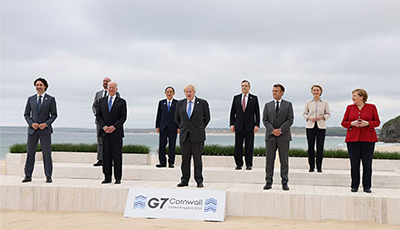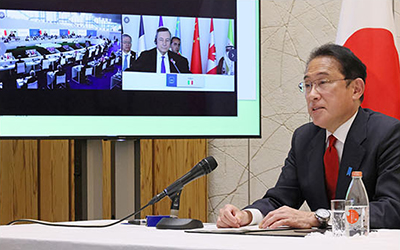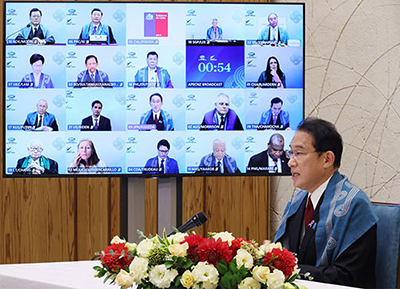Diplomatic Bluebook 2022
Chapter 3
Japan Strengthening Its Presence in the International Community
3 Leading Discussions at International Conferences
(1) G7 and G20
A G7
The G7 holds frank discussions among countries that share fundamental values, and makes a concerted effort to address the wide-ranging issues faced by the international community.
On February 19, soon after the inauguration of the G7 chair, the UK held the G7 leaders' video conference, and the leaders agreed to make the most of their strengths and values as democratic, open economies and societies.
The G7 Summit 2021 in Cornwall, held from June 11 to 13, attracted international attention as the first in-person G7 summit in two years. Under the overall theme of “Build Back Better,” leaders held frank discussions on the global economy and trade, as well as diplomacy and security. International organizations as well as outreach countries outside of the G7 (Australia, India, the ROK, and South Africa) also attended parts of the summit.
Prime Minister Suga emphasized the importance of promoting the multilateral trading system and addressing supply chain vulnerabilities in order to achieve “Build Back Better,” as well as promoting DFFT as a means to achieve an open society. With regard to international health, Prime Minister Suga presented initiatives being undertaken by Japan to propagate vaccines and strengthen health systems. On climate change, he announced Japan's intention to provide assistance amounting to 6.5 trillion Japanese yen through the public and private sectors over the five years from 2021 to 2025, including further enhancement of assistance for adaption.
During the discussion, some members including Japan mentioned China, and the G7 confirmed to continue discussions on collective approaches to non-market policies and practices that undermine the fairness and transparency of the global economy. The G7 also confirmed to call on China to respect human rights and fundamental freedoms, especially in Xinjiang and in Hong Kong, and to cooperate on global issues such as climate change and biodiversity. The G7 leaders remained seriously concerned about the situations in the East and South China Seas, and concurred that they strongly opposed any unilateral attempts to change the status quo and increase tensions, underscored the importance of peace and stability in the Taiwan Strait, and encouraged the peaceful resolution of cross-Strait issues.
Following their discussions, G7 leaders agreed to collaborate to beat COVID-19, build back better, and promote democratic and open economies and societies based on international cooperation and multilateralism. The G7 Leaders' Communiqué and other documents were issued as deliverables.
Many ministerial meetings were also held in addition to the summit meeting. At the G7 Foreign and Development Ministers Meeting that was held in person twice, from May 3 to 5 in London, and on December 11 and 12 in Liverpool, ministers engaged in lively discussions concerning regional affairs including North Korea, China, Russia, and the Middle East, and affirmed an intention to cooperate at the G7 on issues such as the COVID-19 response, girl's education, climate change, and humanitarian crises. Freedom of media, cyber governance, and freedom of religion and belief were among other issues discussed. Foreign ministers from ASEAN countries were invited to take part in the meeting in December and participated in person or online, and discussed cooperation between the G7 and ASEAN.
 G7 Cornwall Summit
G7 Cornwall Summit(June 11, Cornwall, UK; Photo: Cabinet Public Relations Office)
B G20
The G20 is the first forum for international economic cooperation participated in by both major developed countries and emerging countries.
At the G20 Rome Summit, held on October 30 and 31, the G20 leaders discussed important issues such as global health, climate change, and development based on the three pillars of action “People, Planet, and Prosperity” under the Italian Presidency. At the end of the meeting, the G20 Rome Leaders' Declaration was adopted. Prime Minister Kishida pointed out the importance of improving access to vaccines and preparing for a future health crisis. In addition, he explained Japan's stance on DFFT, high-quality infrastructure investment, and fairness and transparency in development finance, while also emphasizing the importance of climate finance from developed countries and contributing to discussions among the leaders.
Furthermore, Foreign Minister Motegi attended the G20 Foreign and Development Ministers' Meeting, which was held in Italy on from June 28 to 30, and engaged in discussions concerning such issues as multilateralism, Africa, food security, development, and humanitarian assistance.
 G20 Rome Summit
G20 Rome Summit(October 30, Rome, Italy; Photo: Cabinet Public Relations Office)
(2) Asia-Pacific Economic Cooperation (APEC)
APEC is a framework of economic cooperation in which 21 economies (countries and regions) in the Asia-Pacific region participate. The Asia-Pacific region is the “world's growth center,” accounting for about 40% of the world's population, about 50% of the world's trade volume, and about 60% of the world's total GDP. APEC, in order to liberalize and facilitate trade and investment in the region, conducts activities such as deepening regional economic integration, and enhancing economic and technical cooperation. The Asia-Pacific region, which thrives by liberalizing trade and investment and strengthening connectivity in accordance with international rules, is the core of a “Free and Open Indo-Pacific” that Japan has been promoting. Japan's active involvement in and promotion of cooperation with APEC is of great significance to the effort to support our own economic growth and the overseas expansion of Japanese companies.
For APEC 2021, chaired by New Zealand, discussions were held at a variety of meetings throughout the year, all conducted online. The discussions revolved around an overarching theme-“Join, Work, Grow. Together”-as well as three priority areas: (1) economic and trade policies that strengthen recovery, (2) increasing inclusion and sustainability for recovery, and (3) pursuing innovation and a digitally enabled recovery. Specifically, amid an exploration of the role that trade could play in facilitating the trade of essential goods and services during the COVID-19 pandemic and responding to climate change, discussions were held on technically updating the List of Environmental Goods and the potential for its expansion in the future, creating a reference list of environmental services and future updates, and reducing inefficient fossil fuel subsidies.
At the APEC Economic Leaders' Meeting held online on November 12, the 2021 APEC Economic Leaders' Declaration was adopted as well as the Aotearoa Plan of Action as an annex for implementing APEC Putrajaya Vision 2040. The Aotearoa Plan of Action comprises chapters on “trade and investment,” “innovation and digitalization,” “strong, balanced, secure, sustainable and inclusive growth,” and “continuous improvement of APEC as an institution,” and lays out specific issues and directions that each economy should work on individually and that APEC should address across the entire organization.
At the Leaders' Meeting, Prime Minister Kishida announced that he would put Japan's economy on a new growth track by realizing the idea of a “New Form of Capitalism,'' which also contributes to Asia-Pacific growth. He also called for a number of measures necessary for post-COVID-19 growth. These included realizing a free and fair trade and investment environment and building a resilient supply chain to boost the economic recovery, maintaining a high standard for the CPTPP Agreement, continued contributions to building a free and fair economic order in the region, promoting DFFT in the digital age, pursuing zero emissions across Asia through support for decarbonization, and stabilizing the international crude oil market.
Thailand will host APEC 2022.
 APEC Economic Leaders' Meeting
APEC Economic Leaders' Meeting(November 12, Photo: Cabinet Public Relations Office)
